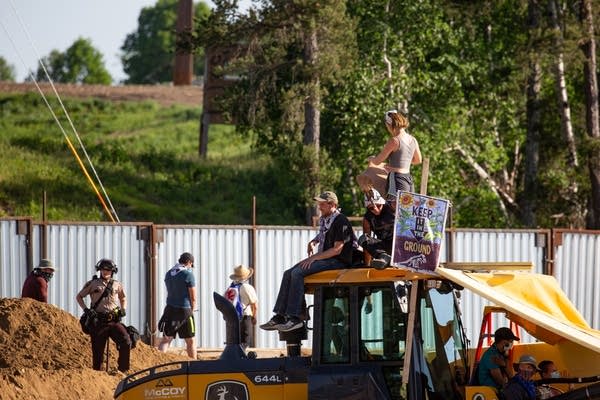Hundreds of protesters vowing to do whatever it takes to stop a Canadian-based company’s push to replace an aging pipeline blocked a pump station Monday in northern Minnesota, with some people chaining themselves to construction equipment before police began making arrests.
Environmental and tribal groups say Enbridge Energy’s plan to rebuild Line 3, which would carry Canadian tar sands oil and regular crude from Alberta to Wisconsin, would worsen climate change and risk spills in sensitive areas where Native Americans harvest wild rice, hunt, fish, gather medicinal plants, and claim treaty rights.
By evening, at least 30 people were arrested by state police and sheriff’s officers, but the number “is growing rapidly,” Ashley Fairbanks, a spokeswoman for Treaty People Gathering, told The Associated Press.
None of them appeared to resist as allies chanted “We love you.” Protesters said the Treaty People Gathering was the largest show of resistance yet to the project.
The crowd showed no signs of leaving hours after an earlier protest at the headwaters of the Mississippi River, roughly 20 minutes away, where they chanted “Stop Line 3!” and “Water is life!
“This is important. This is what we need,” actress Jane Fonda told the AP at the rally, motioning toward the crowd as she held signs with President Joe Biden’s image that said, “Which side are you on?”
She urged protesters to keep pressuring Biden to halt construction so his administration can study any harm to the environment and indigenous people. The Mississippi River is one of the water crossings for the pipeline.
Fonda said Line 3 protesters “are going to Standing Rock this place,” referring to the Dakota Access pipeline, which is owned by a different company and was the subject of major protests near the Standing Rock Indian Reservation in the Dakotas in 2016 and 2017.
Activists said they were pitching tents at the pump station site Monday night, and an AP reporter saw people rolling a large wooden spool that holds wire into a pile of trees and twigs. Police were directing traffic.
Elizabeth Claggett-Borne, 55, of Cambridge, Massachusetts, sat in a beach chair perched in front of a boat blocking the entrance to the work site. She was equipped with a homemade device made of rebar, PVC pipe and handcuffs, in order to make it more difficult for authorities to remove her from the site.
“We’re just foot soldiers,” she said. “But we’re here to stay.”
Minnesota Public Radio News reported that a Border Patrol helicopter at one point hovered about 20 feet (6 meters) off the ground, blowing up sand and dirt, to try to get protesters to leave.
Enbridge said that 44 workers were evacuated from the site in an effort to de-escalate the situation. In a written statement, the company said it “hoped all parties would come to accept the outcome of the thorough, science-based review and multiple approvals of the project.”
Spokeswoman Juli Kellner said the company will assess potential damage once it can safely reenter the site.
Enbridge says the 1960s-era Line 3 pipeline is deteriorating and can run at only about half its original capacity. It says the new line, made from stronger steel, will better protect the environment while restoring its capacity and ensuring reliable deliveries to U.S. refineries.
More than 300 groups delivered a letter to Biden last month calling on him to direct the Army Corps of Engineers to suspend or revoke Enbridge’s federal clean water permit for the project. They urged Biden to follow the example he set on the first day of his administration, when he canceled the disputed Keystone XL pipeline, citing worries about climate change.
Biden has not taken a stand on Line 3, and Minnesota Democratic Gov. Tim Walz is letting the legal process play out
Biden’s administration has declined to shut down the Dakota Access pipeline. In Michigan, Enbridge is defying an order by Democratic Gov. Gretchen Whitmer to shut down its Line 5 because of the potential for a spill in a channel linking two Great Lakes.
Enbridge is gearing up for a final construction push on Line 3, which clips a corner of North Dakota on its way across northern Minnesota to Enbridge’s terminal in Superior, Wisconsin. The Canadian and Wisconsin replacement segments are already carrying oil. The Minnesota segment is about 60% complete. The company has said it plans to put the line into service late this year.
Enbridge, which updated the projected total cost for Line 3 in February to $7.3 billion (U.S.), has been touting the economic benefits, including about 4,000 jobs as full-scale work resumes.
Both sides are awaiting a ruling from the Minnesota Court of Appeals on a legal challenge by environmental and tribal groups that want to overturn state regulators’ approval of the project. The court is expected to rule by June 21 on whether Enbridge adequately proved a long-term need.
The independent Public Utilities Commission approved the project, but the state Department of Commerce, two tribes and other opponents argue that the company’s demand projections failed to meet the legal requirements. Enbridge and the PUC say the projections complied.

